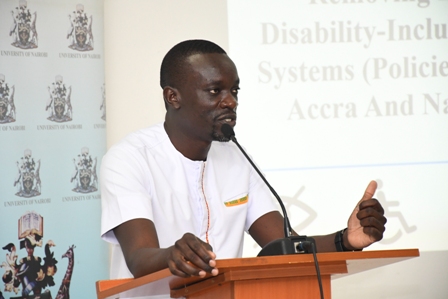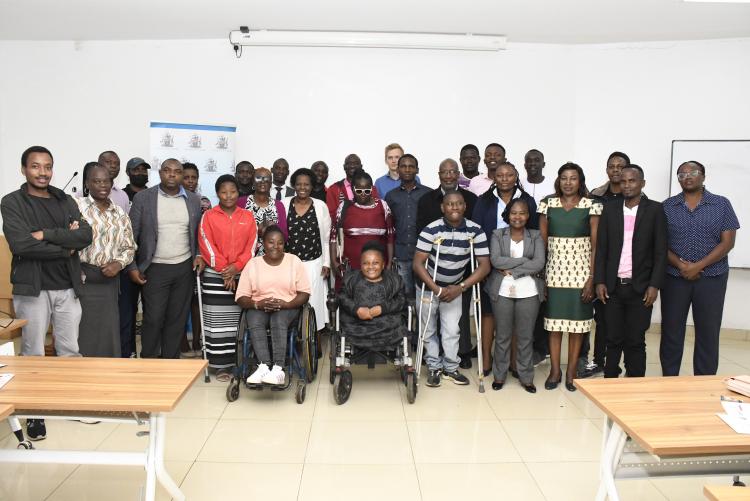Stakeholders from diverse sectors gathered at the University of Nairobi Towers on May 15th, 2024, for a vital dissemination workshop to enhance disability-inclusive urban transport systems in Accra and Nairobi. This event, organized around the research project "SITUATE-2: Removing Barriers To Foster Disability-Inclusive Urban Transport Systems in Accra And Nairobi," marked a significant milestone in addressing accessibility challenges faced by persons with disabilities (PWDs) in public transportation.
The project's Co-Principal Investigator, Dr. Michael Munene from the Department of Art and Design, led the session and invited key presenters to share their insights. Mr. Bramwell, representing Nairobi County's Gender and Inclusivity Deputy Director, highlighted the county's commitment to inclusive mobility, emphasizing the need for faster compliance with existing laws mandating designated seating for PWDs on public vehicles.

Insights into the Accra context were provided by Dr. Kwame Odame from the University of Education Winneba, Ghana. The SITUATE-2 project builds upon prior research, focusing on training for transport operators, signage implementation, and enhancing disability-user-friendly features in vehicles.
Dr. Elizabeth Wamuchiru from the Department of Urban and Regional Planning presented findings from the project stating “The research team implemented interventions such as prototyping an electric bus with features like reserved seats, ramps, and wide doors to facilitate accessibility for persons with disabilities (PWDs).” The research team also conducted interviews with 51 PWDs who had used the bus.
Key findings include:
- Priority seats and wide doors were highly appreciated by PWDs as they improved accessibility and comfort.
- The ramp and low floor were particularly beneficial for wheelchair users.
- Improved attitudes of bus operators positively impacted the experience for PWDs.
- Challenges were faced with signage, communication aids, and understanding the functionality of certain features.
- Sixty-five percent of participants felt the interventions were inadequate, and they recommended providing more disability-inclusive buses, education/training, and communication aids.
- Stakeholders proposed financing inclusive transport projects, adhering to inclusive designs, enforcing disability laws, collaborating among stakeholders, and providing education and training on disability matters.
The study highlights the need for policy enhancements, regulatory frameworks, infrastructure improvements, technology integration, capacity building, collaborative partnerships, and continuous evaluation to foster disability-inclusive urban transport systems.
Recommendations from the workshop included enhancing policies and regulatory frameworks, conducting awareness campaigns, investing in accessible infrastructure, embracing technological solutions, providing capacity building for transport operators, fostering collaborative partnerships, and establishing continuous evaluation mechanisms.
Jane Wamugu from the National Council for Persons with Disabilities delivered concluding remarks, calling for the enactment of laws and policies that uphold the dignity of PWDs during transit. "Inclusive mobility should be accessible regardless of users economic background," she stated, urging stakeholders to address mobility challenges comprehensively.
The findings and proposals shared during the SITUATE-2 workshop provide a roadmap for policymakers, city authorities, and transportation providers to create a more inclusive and accessible cities.
The event brought together a diverse group of stakeholders, including people with disabilities, representatives from the Nairobi County Government, a Matatu Sacco representative, the National Council of People with Disabilities, and staff from the University of Nairobi.
The SITUATE-2 workshop serves as a roadmap for policymakers, city authorities, and transportation providers to create more inclusive and accessible cities. By addressing policy gaps, enhancing infrastructure, and fostering collaborative efforts, stakeholders aim to improve the overall urban transport experience for PWDs in Accra and Nairobi.
- Log in to post comments

